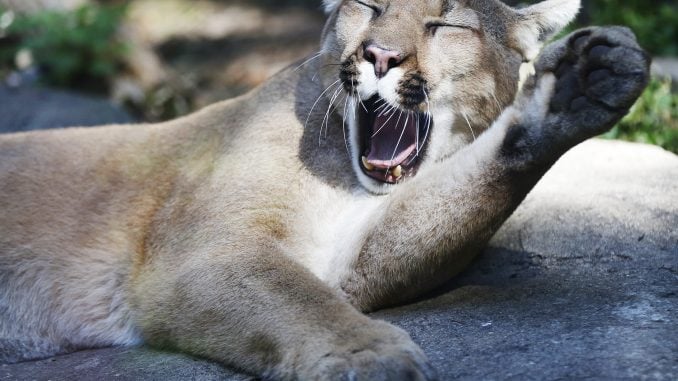
ASHEBORO — The North Carolina Zoo in Asheboro is home to roughly 200 different species, from African elephants that can weigh six tons to a peregrine falcon that can reach speeds of 240 mph in the wild.
In this first installment of some of the personal stories of the North Carolina Zoo’s population, we have an up-close look at a species of many names: catamount, puma, panther, mountain lion, or as the zoo calls them, cougars Heath and Olive.
Zookeeper Paul Decker, a Greensboro native who has three decades of experience and is a 22-year veteran of the park, has cared for the brother and sister since they came to Asheboro three years ago with their littermate, Willow, after their mother was legally shot by a hunter in Oregon.
“This was an unusual case where the gentleman hunting was knowledgeable on the system, so by regulation when he shot the animal, upon inspecting the carcass, he discovered it was a lactating, nursing female,” Decker said. “So by regulation he has to report that.
“And thank goodness there was snow on the ground,” Decker added. “He went and got an officer, they tracked back to the den from mom’s tracks where she deceased, and that’s where they found the kittens. Had there been no snow, it’s very unlikely they would have found them.”
Willow proved to be the most independent of the three, and while Heath and Olive — now “teenagers” in cougar years — get along fine, she was relocated to Lincoln Park Zoo in Manitowoc, Wisc., when she was about 9 months old.
“Olive and her sister, Willow, were very opposite personalities,” Decker said. “Willow is very self-sufficient, outgoing. So they wouldn’t have gotten along at all. And we picked her to leave because she was so psychologically more tough. We figured she could handle relocation better.”
Decker said cougars are the largest purring cats in the world, and Olive and Heath act very much like oversized house cats.
“Olive is your typical, slightly nervous female cat,” Decker said. “Very shy yet needy at the same time.”
Heath, meanwhile, is the more dominant of the two, a “goofy male cat that blunders along and is just sort of unaware of everything.”
Decker is navigating their awkward teenage years with care — the siblings are quite attached to him, so he keeps an eye on them during their viewing hours from hidden spots around their canopied enclosure.
Cougars are light enough to climb out of any space without a top, so the canopy keeps Heath and Olive from escaping. Cougars are not naturally in the wild in North Carolina anymore, but are still spotted in the state because the pet trade leads to people releasing the animals after “discovering what a bad idea it was,” Decker said, or the animals escape, often by climbing.
“When I started doing this 30 years ago, I might meet one person a year who has seen a cougar in North Carolina, now it’s about once a week,” Decker said.
But it’s a common misconception that wild cougars will hunt for humans in the wild. Decker said only a desperate animal will look to humans as a meal, and that “we’re really not all that palatable. … Basically, we’re the hot dogs of the prey world. We eat tons of chemicals.”
Fear of cougars and hunting for sport from the 1920s through ’50s led to a decrease in range and population and naturally wild cougars are now only out west — the nonprofit Cougar Network estimates there are now 30,000 cougars in the western United States — and in a small swatch of Florida, where efforts to save the Florida panther are struggling due to loss of habitat.
“Conservation is really not so much about species saving, it’s the habitat,” Decker said.
For now, Olive and Heath are content together, far removed from the snowy den they were found in as kittens.
“We’re hoping Olive and Heath can spend their lives together, but there’s no guarantee,” Decker said.



